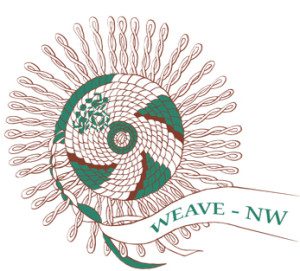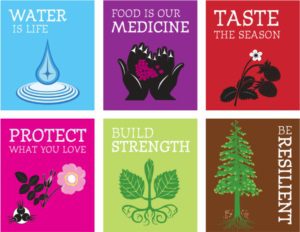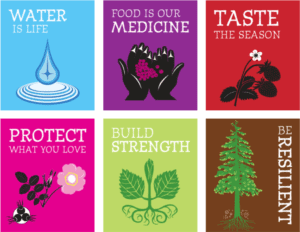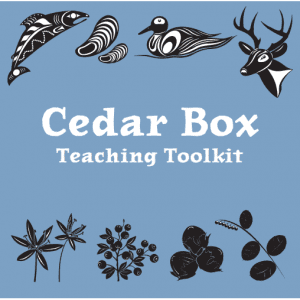Food Sovereignty Initiatives
For decades, tribes in the Northwest region (Idaho, Oregon, and Washington) have implemented food sovereignty and traditional food projects to reclaim their food systems and to improve the health of their communities. The Northwest Portland Area Indian Health Board supports this work by providing trainings, technical assistance, and meeting facilitation to the NW tribes.
Training, technical assistance, and meeting examples:
- Food Sovereignty Assessment Tool Training
- Program and evaluation planning
- Survey design and implementation
- Policy training, including; writing and development
- Facilitation of strategic and action planning meetings

Defining Food Sovereignty in the Northwest:
Some tribal community members have defined food sovereignty as “…the most important work we can be doing in these times. Being able to feel independent, healthy, and intimately connected to what nourishes us and gives us life. It involves respect for old ways, and adapting to, caring for, and protecting what is available today”. At the 2019 NW Tribal Food Sovereignty Coalition Gathering, we asked some of Food Sovereignty Leaders in the Northwest the importance of food sovereignty to them and their communities. This is what they had to say:
- NW Tribal Food Sovereignty Coalition
- Media
- Resources
The NW Tribal Food Sovereignty Coalition is an opportunity for tribes and tribal organizations to convene efforts that are driven by cultural revitalization, empowering communities, and the use of innovative strategies to improve the health of the people.
Vision: Connect and ground ourselves with our Indigenous knowledge and cultural values.
Mission: “To reclaim our indigenous knowledge of plants, land, and natural environment to maintain and improve our health and quality of life for ourselves and future generations.”
Values:
- Stewardship
- Reciprocity (mutual exchange)
- Respect
- Relationships
- Plants, spirit, natural environment
- Connection with people and inter-tribal sharing
ATNI Food Sovereignty Sub-Committee:
The NTFSC was successful in getting approval from the Natural Resources Committee at the Affiliated Tribes of Northwest Indians (ATNI) to have a Food Sovereignty Sub-committee. This sub-committee meets during the ATNI convenings in January, May, and October. For more information on the next ATNI convening and to view passed resolutions from the Food Sovereignty Sub-Committee, please visit their website at www.atnitribes.org
Documents:
- Native American Focused Food Sovereignty Resources-Integrative Learning Experience by Joshua Brown, University of Montana
- Tribal Food Sovereignty Conceptualization, Policy, Programming and Evaluation: From Idea to Implementation
Publications:
- NW Tribal Food Sovereignty Coalition: An Intertribal Collaboration by Nora Frank-Buckner in collaboration with the NW Tribal Food Sovereignty Coalition

“Posters are free for NW Tribal Communities and Tribal Organizations contact weave@npaihb.org to request them.”
Native Infusion – Rethink Your Drink
Native Infusion is a teaching toolkit aimed to support you and your community in making healthy choices about beverages. The toolkit integrates Native American cultural teachings and traditional health and nutrition concepts from the Coast Salish region.
Learning Objectives
Participants will learn about how ancestral beverages contribute to physical, spiritual and planetary health. Participants will learn methods for preparing healthy beverages from traditional plants and foods, including flavored waters, teas, smoothies and broths. Participants will learn how to identify, harvest, process and prepare multiple native plants for tea. Participants will learn about the health impacts of sugary drinks
This Toolkit Includes:
- Curriculum
- Teaching posters
- Feeding 7 Generations Recipe Book
Native Infusion Posters
Posters are free for NW Tribal Communities and Tribal Organizations, Contact WEAVE-NW to request them.
Posters feature Artwork is by Squaxin Island tribal member Joe Seymour and Lower Elwha tribal member Roger Fernandes
The Cedar Box Teaching Toolkit is an educational resource featuring important native foods in Salish Country and the rich cultural traditions that surround them. The foods were selected because of their high nutritional value, cultural significance, and reasonable availability.
Educators can use the cedar box toolkit in a variety of settings including classrooms, community workshops and other educational events. Possible presentation formats include a “show and tell” overview of Salish foods, an exhibit, or a complete curriculum for teaching in depth classes on individual foods. The information in this curriculum only scratches the surface of the vast cultural knowledge for each food. We hope that you can add your own community knowledge, stories, artwork, preserved foods and language to your toolkit over time.
This Toolkit Includes:
- Cedar bentwood box:
- cooking tongs
- cooking rocks
- display containers
- teaching cards
- preserved samples of 13 native foods
- Videos about foods and food traditions that feature native storytellers
- Curriculum including Salish food descriptions, recipes, stories and activities
- Feeding 7 Generations poster
- Feeding 7 Generations recipe book
Other Food Sovereignty Related Organizations:
- Affiliated Tribes Of Northwest Indians
- Columbia River Intertribal Fish Commission
- First Nations Development Institute
- Indigenous Food and Agriculture Fund
- The Model Tribal Food and Agriculture Code
- Native American Agriculture Fund
- Seeds of Native Health
- Tribal Food Sovereignty Advancement Initiative- National Congress of American Indians
- Cedar Box Teaching Toolkit
- Native Infusion

